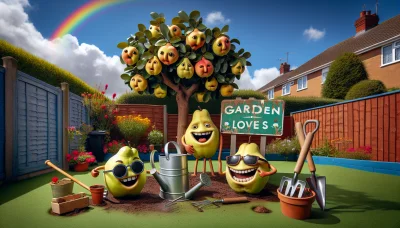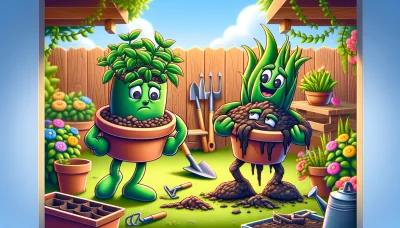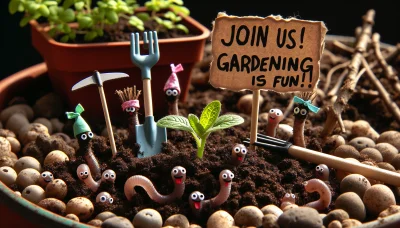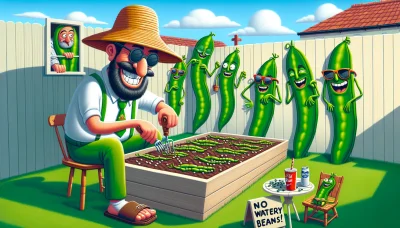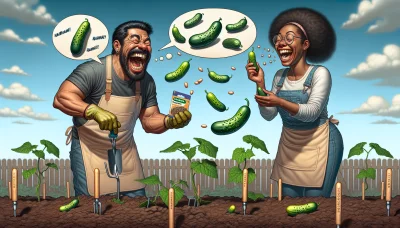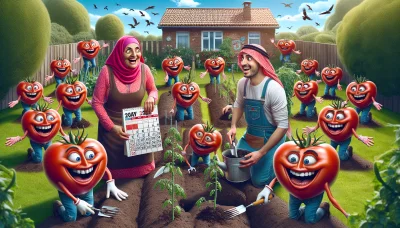Pest Control in Vegetable Gardening Quiz
Test Your Knowledge
Question of
Pest Control in Vegetable Gardening
Pest control is a critical aspect of maintaining a healthy vegetable garden. It involves managing or eliminating pests that can cause harm to your plants, ensuring they grow to their full potential. Without proper pest control, your garden can quickly become overrun by a variety of insects and diseases, leading to reduced yields and even total crop failure. Effective pest control not only protects your plants from damage but also helps in maintaining the balance of your garden ecosystem. By implementing strategies for pest control, gardeners can ensure their vegetable plants thrive, producing a bountiful harvest of fresh, healthy produce.
Common Pests in Vegetable Gardens
- Aphids: Small, soft-bodied insects that can be green, yellow, black, or brown. They suck the sap from plants, causing leaves to curl, wilt, or yellow.
- Tomato Hornworms: Large, green caterpillars with a horn-like tail. They feed on tomato plants, eating leaves, flowers, and young fruit.
- Cabbage Worms: Velvety green larvae that feed on the leaves of cabbage, broccoli, kale, and related plants, creating holes in the foliage.
- Squash Bugs: Brown or gray bugs that suck the sap out of squash and pumpkin plants, leading to wilting and death of the plant.
- Japanese Beetles: Metallic blue-green beetles, about 1/2-inch long, that feed on the leaves, flowers, and fruits of more than 300 plant species.
- Colorado Potato Beetles: Yellow and black striped beetles that feed on potato leaves, but can also affect tomatoes, eggplants, and peppers.
- Spider Mites: Tiny spider-like pests that attack a wide variety of plants, causing the leaves to appear speckled or yellowed. They thrive in hot, dry conditions.
Organic Pest Control Methods
Using organic methods for pest control in vegetable gardens offers numerous benefits that contribute to a healthier and more sustainable gardening practice. Unlike chemical pesticides, organic pest control minimizes the risk of harming beneficial insects that contribute to pollination and natural pest management. It also ensures that vegetables are free from harmful residues, making them safer for consumption. Additionally, organic pest control supports soil health, enhancing its structure, fertility, and ability to retain water, which is crucial for plant growth. Embracing organic methods helps maintain the ecological balance within the garden, promoting biodiversity and reducing the gardener's carbon footprint.
- Introducing beneficial insects like ladybugs and lacewings to control aphid populations.
- Applying neem oil, a natural pesticide, to deter pests without harming plants or beneficial insects.
- Using diatomaceous earth to physically deter pests with its abrasive qualities.
- Implementing companion planting to naturally repel pests and attract beneficial insects.
- Cultivating a healthy soil ecosystem through organic composting, which enhances plant health and resistance to pests.
- Employing barriers and traps, such as floating row covers and pheromone traps, to protect plants from pests.
Chemical Pest Control Solutions
Chemical pest control solutions should be used in vegetable gardening as a last resort, after all other methods such as physical, cultural, and biological controls have been tried and found ineffective. When applying chemical pesticides, it's crucial to select products that are specifically labeled for use on edible plants and to strictly follow the label instructions regarding application rates and timing. Safety is paramount; wear protective clothing, gloves, and masks to avoid direct contact with the chemicals. It's also important to consider the impact of these chemicals on beneficial insects and the environment. Always aim to use the least toxic option available, and apply them during times when beneficial insects are less active, typically early morning or late evening. Additionally, ensure that there is no imminent rain forecasted to prevent runoff into waterways. After applying chemical treatments, adhere to the waiting period before harvesting to ensure that the produce is safe for consumption.
Integrated Pest Management (IPM) in Vegetable Gardening
Integrated Pest Management (IPM) is a sustainable approach to managing pests by combining biological, cultural, physical, and chemical tools in a way that minimizes economic, health, and environmental risks. In vegetable gardening, IPM involves monitoring for pests and their damage and using this information to make informed decisions about the need for control measures. The goal is to suppress pest populations below levels that cause unacceptable damage to crops, while also reducing the reliance on chemical pesticides. Strategies include selecting resistant vegetable varieties, rotating crops, using natural predators or beneficial insects, and applying pesticides only as a last resort and in a targeted manner. By focusing on long-term prevention and being mindful of the ecosystem, gardeners can effectively manage pests in a way that is safer for both the garden and the environment.
Preventive Measures for Pest Control
- Rotate crops each year to prevent pests from becoming established.
- Choose pest-resistant plant varieties when planning your garden.
- Keep the garden area clean and free of debris where pests can breed and hide.
- Use natural predators like ladybugs, birds, and beneficial nematodes to control pest populations.
- Maintain healthy soil with good composting practices to strengthen plant resistance.
- Use floating row covers to physically block pests from reaching plants.
- Water plants in the morning to avoid excess moisture overnight, which can attract pests.
- Inspect plants regularly for early signs of infestation and take immediate action.
- Practice companion planting to deter pests naturally with certain plant combinations.
- Remove and destroy infected plants to prevent the spread of pests and diseases.


